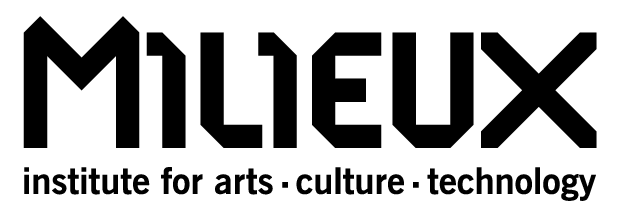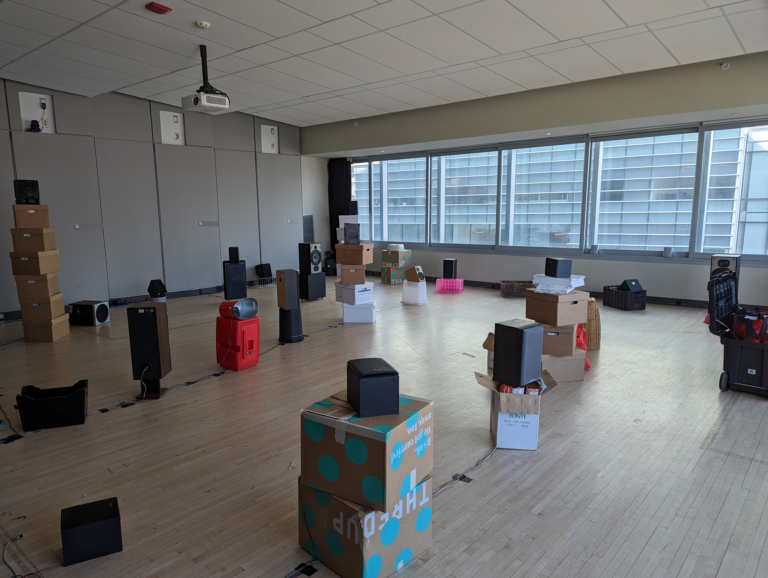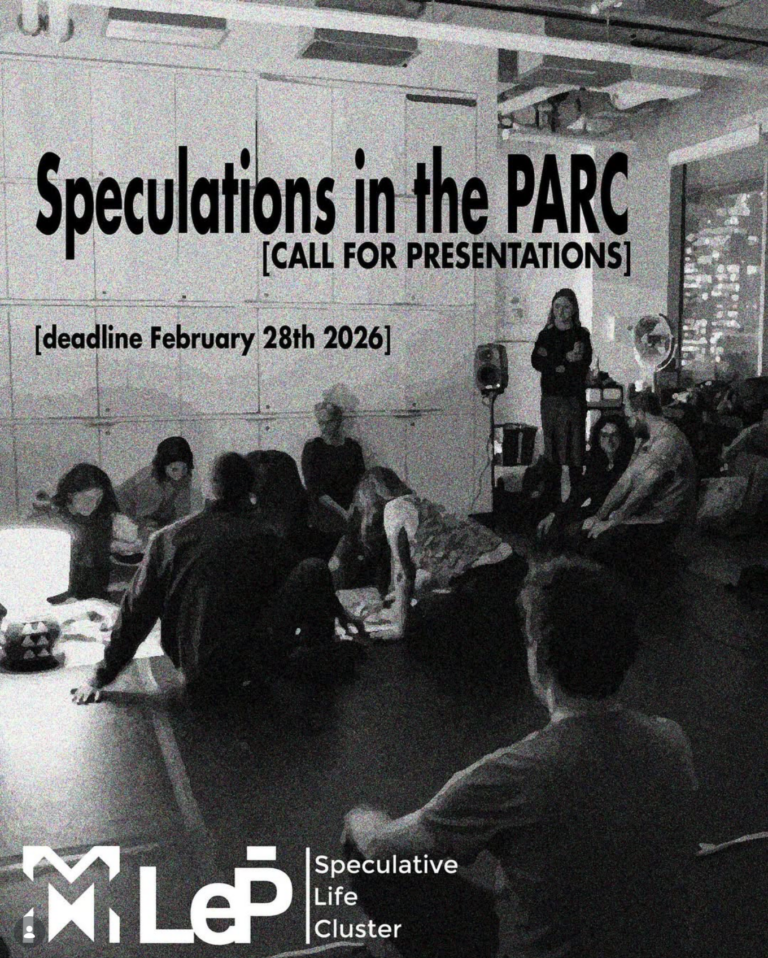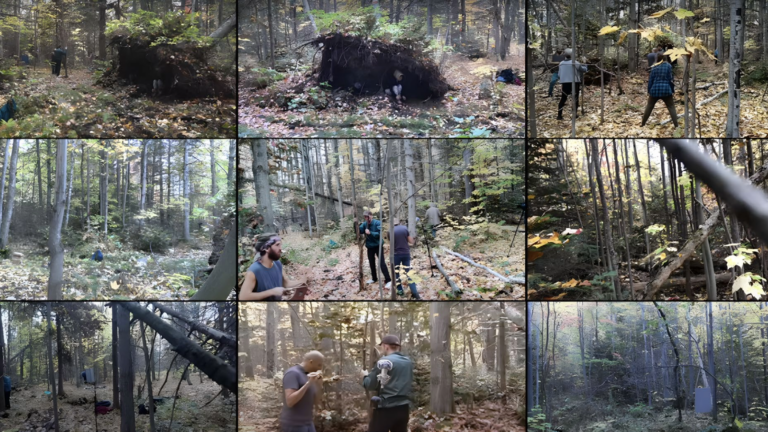Marc Lajeunesse is a Research Associate, coordinator of Milieux’s TAG cluster, and the host of the Milieux Podcast. He’s also the co-author of Streaming by the Rest of Us. Across the first season of the podcast, Lajeunesse has interviewed faculty, staff and students involved in Milieux’s clusters and research groups, diving deep into the hustle and bustle of Milieux. But what drew Lajeunesse to the podcast format? And what has he discovered through the process?
Here, Milieux Storyteller Rosie Long Decter sits down for a conversation about the Milieux Podcast with Lajeunesse, interviewing the interviewer.
Rosie Long Decter (RLD): So: why a podcast?
Marc Lajeunesse (ML): I suppose from an ideological standpoint, I think a podcast is more of a relaxed, chill way to get academic-oriented information to people. It’s less scary than a conference talk or just the general kind of publicity that universities do.
I wanted it to be based around conversations that feel human, to realize that the people who do research are interesting to hear from – they aren’t research robots.
RLD: What was the process like? Any particular challenges?
ML: The one consistent challenge is that when every interviewee sat down, I don’t think any of them have any media training, and that’s not really an issue except there’s a barrier of getting people comfortable. Which took about three minutes.
People felt like they weren’t ready or had nothing to say, but the challenge resolves itself immediately – as soon as you put the mic in front of them and actually ask them a question that they’ve been dying to be asked, maybe for years. Like, “why do you love what you do?”
Imagine actually being asked that at a conference. It just doesn’t happen, and yet it’s so fundamental to why anyone does anything. So as soon as they realize that, oh, they can just express their love for doing research, then they can let loose. I think it’s a beautiful thing to hear.
RLD: So many research settings focus on “why is your research important” not, “why are you passionate about it,” or “what gets you going about it.”
ML: Why do you wake up in the day to do this thing? For way less money than you would get – and this is true of even the people operating at the highest level of academia – if you just went out into an industry and used the skills that you have, right? There’s a deep love that’s required to do research.
RLD: What about any pleasant surprises that came out of the podcast process?
ML: Literally every talk was a pleasant surprise. You don’t know where they’re going to go. Nothing felt cookie cutter, every answer felt as though it was driven by some kind of passion, and learning about those passions was just exciting every time.
Interviewing Marc Beaulieu [Head of Technical Support and Infrastructure at Milieux] was so nice – getting a look in on the technical side of how a research centre, or an assortment of research centres like Milieux, operates and what’s required and how much love goes into making sure the spaces are great. This all works because a few people really care and are trying really hard to make sure all these different crazy research projects can happen.
RLD: Beaulieu talked about how his passion is supporting other people’s research – that was really lovely to listen to, to get a sense of how much of a support system there is. Every individual research project is made possible by a whole network operating around it.
What did you learn about Milieux from doing all these interviews? Was there anything where you were like, I didn’t even know that was going on?
ML: From the whole process of doing the podcast, I learned that we have this amazing recording studio. There are so many resources. I have been a grad student at Milieux since 2016 – it took me eight years to learn that there’s a really cool recording studio we could have used. And that’s true of a million different resources, like the textiles lab, the bio lab, all these sites.
Part of the podcast is making sure we can put all that stuff in front of people so they know what they can do.
RLD: Were there particular cluster activities that stood out to you?
ML: I mean the Ethnography Lab at Speculative Life is just great. I do ethnography in my own work, and again having done ethnographic research for eight years, I didn’t really know that that’s what happened at Spec Life. I was attached to TAG as a student, but this other thing was waiting there the whole time!
Hopefully the podcast can shore up some of that lack of knowledge that students might have who sit between a few different kinds of practices.
RLD: It can be really hard to find your place as a grad student. And then once you find one spot that works, it’s not obvious to keep searching for other spaces as well.
ML: Absolutely. The social labour is really challenging when you have so many other grad student responsibilities.
RLD: Finding that milieu for yourself – so to speak – is an extra piece of the puzzle that you’re not being funded to do. It falls just a bit outside the strict obligations of research and course work and can be harder to prioritize. But it’s so important to have in order to make the research and course work feel possible or part of something.
ML: Hopefully this podcast is a little breadcrumb that someone can find, leading to another place that feels like their place.
RLD: In each episode, you’re focusing on the clusters but you’re also talking about what Milieux is as a whole and what these clusters offer to people. I’m curious if there were any recurring themes that you noticed across the interviews?
ML: I ended every episode with a word association game – what are three words that you associate with Milieux? – and some version of collaborative was always in there.
Milieux works because people are working together. We’re supposed to be cross-cluster people, that’s the idea of the centre, and sometimes it feels like there’s a great distance between people across clusters but that’s only because there’s so much happening all the time.
It’s hard to not have some kind of FOMO when you have all these different stems coming off of Milieux and they’re all active. If you actually put together what a human being has the time to do, usually there’s some gravitation between two or three clusters or sub-cluster groups. Milieux is big and that’s okay. You don’t have to do everything.
But also, part of the reason the podcast exists in the first place is because there’s so many people who have Milieux access, who have supervisors who are part of Milieux, or who might be even be faculty, who feel like they’re not getting the most that they can out of it.
The idea that came up again and again was: just show up. Just show up, just come to something, right? Everyone wants more people here, the spaces are there to be used – and they do get a lot of use – but more people is always good. There’s so many excited people who want to do different projects, so bring your projects, bring your weird ideas and reach out! Find a way to be here, because we’re waiting – we’re all here just waiting for people to walk in the door and say hello.
RLD: What are your three words for Milieux?
ML: Long fun days.
This interview has been edited for length and clarity.
Check out the Milieux Podcast here.



